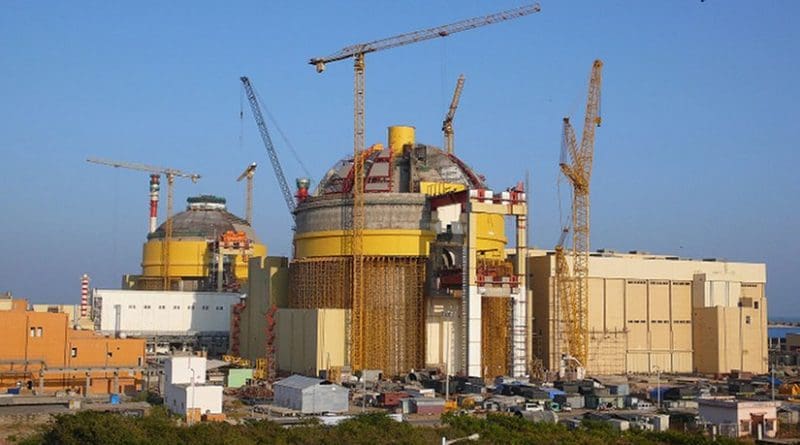Recent Hunt For NSG Membership – OpEd
Even though the rumors of a so-called cooperation among the US and Pakistan regarding a civil nuclear deal is now no more on the front, as far as the nuclear cooperation is concerned it is still on the forefront.
Despite all the allegations of Pakistan over its enhanced nuclear development capabilities and likewise the pre-conditions from the west or more precisely from pro-Indian analysts in pursuit of NSG membership, Pakistan has not and will not accept such a discriminatory attitudes. Such conditions are not acceptable for Pakistan unless the proposed initiatives are also taken by India.
On the dilemma of Pakistan’s induction in the NSG club, Pakistan need not fear much, after the latest pledge from its ever green friend China. Recently during the visit of a high-level delegation to Beijing headed by President Mamnoon Hussain, China assured that if India is allowed to get the membership of the Nuclear Suppliers Group (NSG) it will go all out to ensure that Pakistan also joins the group. “The issue was discussed at length and Pakistan highlighted its point of view saying that it has equal right to join the group for fulfilling its requirement for peaceful use of nuclear technology. Islamabad took the plea that if it is deprived of the NSG membership and New Delhi is allowed to join it then it will be discrimination and lead to creating an imbalance in the region. China, being member of the group and holding the veto power, assured Pakistan that it will take all measures so that it also becomes the member of the NSG, and that if India is allowed to join NSG and Pakistan is deprived of the membership of the group, Beijing will veto the move to block Indian entry.”
The NSG chairman has recently visited New Delhi and held a meeting with the Indian Foreign Minister Sushma Swaraj as part of a diplomatic effort to build a consensus to admit India into the group in its annual meeting next June 2015. NSG was in fact, a body set-up specifically to restrict the diversion of nuclear material from civilian trade to military purposes.
The clandestine diversion of nuclear material and equipment for the so-called Indian Peaceful Explosion of 1974 was the prime reason behind the creation of NSG, 40 years ago. It is an open secret that the illicit breach its international agreements with Canada, i.e., diverted plutonium from the Canadian-Indian Reactor, US (CIRUS) reactor provided solely for peaceful purpose, led the South Asia region into another regional nuclear arms race.
Although, the group is not a formal organization and its guidelines are not binding, still, its members are expected to incorporate the guidelines into their national export control laws. Ironically, it does not mean that any country’s specific diversion or waiver would become legal under the guidelines of NSG.
Indubitably, to step forward and improve the global non-proliferation goals, putting in new members in NSG would be an encouraging and constructive option. Along with, it would be equally vital to uphold the efficacy and effectiveness of NSG. Therefore, the expansion should be carried out on non-discriminatory bases — by taking-on the Criteria Based Approach.
The meeting of June 26-27 in Buenos Aires called for discussion on the NSG’s relationship with India. In this regard, on June 22, 2014 in Argentina, India ratified its Additional Protocol with the International Atomic Energy Agency (IAEA) to expand oversight over its civilian nuclear program. This protocol was approved back in 2009 that paved the way for NSG to grant India-specific waiver for it to have commercial relations with other countries in the civilian atomic field. In effect, the waiver was necessary as India, despite being a nuclear-armed state, is not a signatory to the NPT thus does not qualify for nuclear trade. But even then, the US labeled this ratified protocol as another important step in bringing India into the international non-proliferation mainstream.
On the other hand, if the West is merely to gain their economic benefits from the Asia’s third-largest economy (India) and slots for New Delhi in the NSG club then there would be a disaster for the NSG’s credibility, particularly given the irony of accumulating a member whose actions were the very impetus for the organization’s establishment.
For India, NSG membership could boost its international standing as a responsible atomic power and also give it greater influence on issues related to global nuclear trade as many countries are already in line with similar kind of deals as of 2008. However, the country would be the only member of the body that has not signed up to the NPT; signaling an open discriminatory act towards Pakistan. Since, the NSG decisions is taken on consensus, firstly China has reaffirmed it is not going to happen, but if it happens then India would always stand against any civil trade with Pakistan. This then, would result in leading to a regional nuclear arms race as India is and would remain out of NPT and would neither sign CTBT or FMCT, nor go for the Nuclear Weapons Free Zone. It would be pertinent to say that west’s recent demands to sign CTBT, FMCT; restrain from FSD, etc., is in fact a joke without asking the country who actually was the first player in this regional race to comply.

